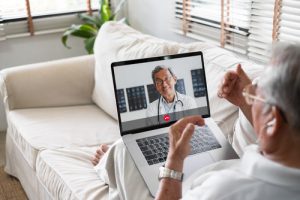
U.S. Rep. Bob Latta (R-OH) on Sept. 17 introduced a bipartisan bill that would allow healthcare professionals who have a valid and unrestricted license to provide in-person care or telehealth visits from any state during national public health emergencies, including the COVID-19 pandemic, without jeopardizing their state licensure.
Rep. Latta sponsored the Temporary Reciprocity to Ensure Access to Treatment (TREAT) Act, H.R. 8283, with cosponsor U.S. Rep. Debbie Dingell (D-MI), to amend current law that requires healthcare professionals to maintain licenses in each state where they provide services, including telehealth services. U.S. Sens. Roy Blunt (R-MO) and Chris Murphy (D-CT) introduced their chamber’s version, the same-named S. 4421, last month.
“With this bill, I am proud we could come together in a bipartisan way to remove barriers to care so that healthcare providers can provide critical services in any location,” Rep. Latta said. “With the TREAT Act, healthcare providers have greater flexibility so they can treat patients regardless of the state they call home.”
If enacted, the measure also would require healthcare professionals to obtain oral or written acknowledgment of services; require them to notify a state or local licensing board within 30 days of first practicing in a state other than where licensed or certified; and would preclude any service that is otherwise prohibited by a state where a patient is located and require adherence to specified prescribing requirements of the state, according to a bill summary provided by Rep. Latta’s office.
The congressman noted that prioritizing the well-being of Americans must be at the forefront of any decision during times of public health emergencies.
“Americans are utilizing telehealth to receive needed care and treatments more than ever before because of the coronavirus pandemic,” said Rep. Latta. “If a healthcare provider is available to provide care remotely but they practice in a different state than the patient, there should not be hoops for the healthcare provider or patient to jump through in order for the patient to receive the care they need.”



